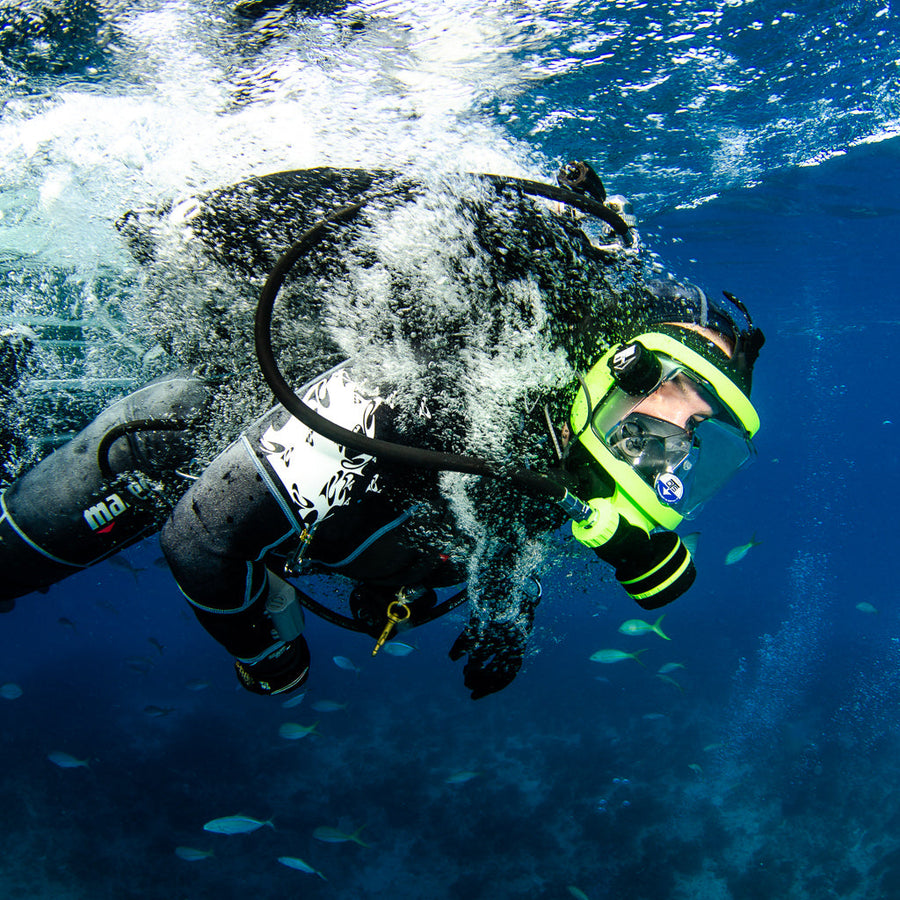Beginner's Guide to Scuba Diving
Posted by Willie Marquez on

The Ultimate Beginner’s Guide to Scuba Diving: Dive Into Adventure with Confidence
Scuba diving opens up a world of breathtaking underwater landscapes and fascinating marine life, but it can seem daunting if you’re just starting out. If you’ve ever dreamed of exploring the ocean's depths but didn’t know where to begin, this guide is for you. From understanding the basics to gearing up for your first dive, we’ve got you covered. Let’s dive in!
What is Scuba Diving?
Scuba diving allows you to explore underwater environments using a Self-Contained Underwater Breathing Apparatus (SCUBA). Unlike snorkeling, which keeps you at the surface, scuba diving lets you descend to greater depths and stay underwater for extended periods.
The First Step: Certification
Before you can start diving, you’ll need to get certified. This involves completing a course from a recognized certification agency. The most popular agencies are:
- PADI (Professional Association of Diving Instructors)
- NAUI (National Association of Underwater Instructors)
- SSI (Scuba Schools International)
These courses typically involve classroom learning, confined water training (usually in a pool), and open water dives to practice and demonstrate your skills.
Choosing Your Certification Course
For beginners, the Open Water Diver course is the entry-level certification. It covers essential skills and safety protocols, including:
- Basic Dive Theory: Understanding pressure, buoyancy, and underwater navigation.
- Equipment Use: How to use and maintain your dive gear.
- Safety Procedures: How to handle common issues and emergencies.
Essential Gear for Beginners
Scuba diving requires specialized equipment to ensure safety and comfort underwater. Here’s a rundown of the basics:
- Mask: Provides clear vision underwater and protects your eyes from irritants.
- Snorkel: Allows you to breathe at the surface without lifting your head.
- Fins: Help you move efficiently through the water.
- Wetsuit/Drysuit: Keeps you warm and buoyant. A wetsuit is sufficient for warm waters, while a drysuit is needed for colder environments.
- Regulator: Delivers air from your tank to your mouth.
- Buoyancy Control Device (BCD): Helps you control your buoyancy and stay stable underwater.
- Tank: Holds the compressed air you breathe underwater.
What to Expect on Your First Dive
Before the Dive:
- Pre-Dive Check: Ensure all your gear is functioning properly.
- Safety Briefing: Review safety procedures and dive plan with your instructor.
During the Dive:
- Descend Slowly: Equalize pressure in your ears as you go down.
- Stay Calm: Maintain controlled breathing and focus on your buoyancy.
- Follow Your Instructor: Stick to the plan and stay close to your guide.
After the Dive:
- Ascend Slowly: Follow the recommended ascent rate to avoid decompression sickness.
- Log Your Dive: Keep a log of your dive details and experiences.
Essential Safety Tips
- Never Dive Alone: Always dive with a buddy or group.
- Follow Dive Tables/Computer Guidelines: Adhere to recommended limits and safety stops.
- Stay Hydrated: Drink plenty of water before and after your dive.
- Avoid Alcohol and Heavy Meals: They can affect your buoyancy and overall diving experience.
Overcoming Common Fears
It’s natural to feel nervous about your first dive. Here are a few tips to help you overcome those jitters:
- Take Your Time: Don’t rush through the learning process. Practice makes perfect.
- Communicate: Talk to your instructor about any concerns you have.
- Focus on Breathing: Slow, deep breaths can help keep you calm.
Continuing Your Diving Journey
Once you’re certified, you can explore more advanced dives and specialties like night diving, wreck diving, or underwater photography. Consider taking additional courses to enhance your skills and broaden your diving experience.
Join the Diving Community
Connecting with other divers can enhance your experience. Join local dive clubs, participate in online forums, or attend diving events to meet like-minded enthusiasts and stay updated on diving news.
Responsible Diving
Respect the underwater environment by following eco-friendly practices:
- Avoid Touching Marine Life: Many creatures are delicate and can be harmed by contact.
- Don’t Disturb the Ecosystem: Be mindful of your surroundings and avoid damaging corals or other habitats.
Conclusion
Scuba diving is an exhilarating and rewarding activity that opens up a whole new world beneath the waves. By following this beginner’s guide, you’ll be well-prepared to start your underwater adventures with confidence. Remember to always prioritize safety, continue learning, and most importantly, enjoy every moment of your dive!
Happy diving, and welcome to the deep blue!